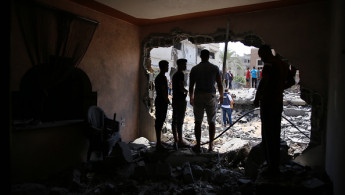Palestinians in Gaza divided over actuality of Hamas-Fatah reconciliation
Residents in the besieged coastal enclave of the Gaza Strip are divided over the sustainability of the upcoming reconciliation agreement between the Hamas and Fatah movements.
Last Thursday, 13 October, 14 Palestinian factions, including Fatah and Hamas, signed an "Algerian declaration" after holding a two-day meeting in Algeria to end fifteen years of division among the main Palestinian political parties.
Based on the declaration, the factions agreed to elect a Palestinian National Council at home and abroad, using a proportional representation system with the participation of all Palestinian factions within a maximum period of one year from the date of signing the declaration.
The draft also calls for the factions to hold general presidential and legislative elections in the Gaza Strip and the West Bank, including occupied Jerusalem, within a maximum period of one year from the date of signing the declaration.
In addition, an Algerian-Arab working group will supervise and follow up on the implementation of the terms of the agreement in cooperation with Palestinian officials.
However, many Palestinians in Gaza believe that the "Algeria declaration" will not be implemented soon as Fatah and Hamas still have maintained their political and ideological differences.
"Neither Fatah nor Hamas is interested in ending their division as each one of them can gain their political benefits alone," Mohammed Abu Mrahil, a resident in Gaza, said to The New Arab.
"Hamas is supported by Iran, while Fatah is supported by the western world, mainly the US (...) the two sides [Iran and US] are enemies, so they [Fatah and Hamas] will remain as rivals forever," he argued.
What made the matter worsen for Abu Mrahil is the fact that even though these movements signed a reconciliation agreement, they were motivated by their own interests.
Ismail al-Atrash, another Gaza-based Palestinian, is more hopeful, saying that the current conditions in the coastal enclave encourage a more unified position among the various Palestinian factions.
"The Gaza gas deal will join Fatah and Hamas, based on the mutual interests of the Palestinian people," he remarked, adding that "Egypt is doing its best to push the Palestinian factions to successfully reconcile and jointly benefit from the gas."
On his part, Hussam al-Dajani, an analyst in Gaza, said to The New Arab believes that the deal will not last. "Unfortunately, I am afraid that reconciliation efforts will fail again for the seventh time, mainly as there are some controversial files still under the discussion by Hamas and Fatah," he said.
"The Palestinian people have been facing great challenges from Israel and the United States, who both support the division, and this threatens the possibility of implementing the terms that were signed in Algeria," he added.





 Follow the Middle East's top stories in English at The New Arab on Google News
Follow the Middle East's top stories in English at The New Arab on Google News


